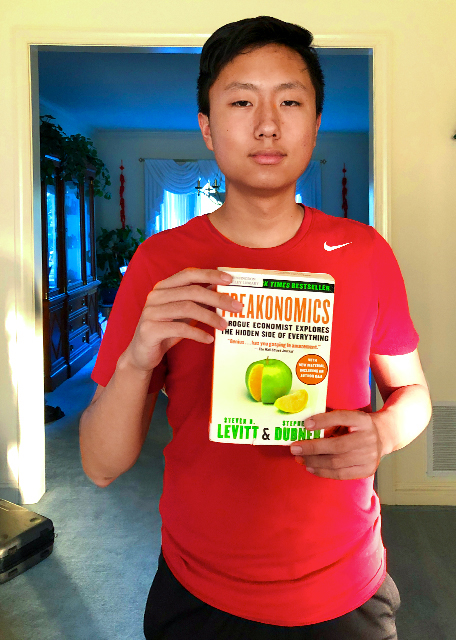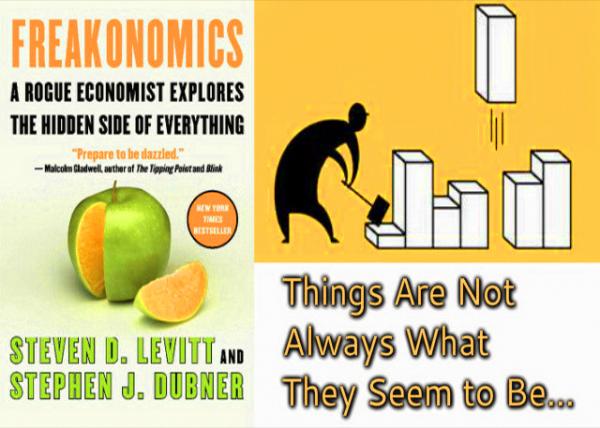2020-01-13 【Aiden in English】
A person strolls past a plastic bag fluttering down the street. In one scenario, he ignores the bag; in another, he recycles the trash. Later that day, the local news reported a car crash caused by a plastic bag. Generally, the individual's actions did not significantly impact the flow of events. Based on his decision, however, the person may experience a range of emotions, from a slight sense of sadness to profound personal anguish. This scenario is one of many ideas that I frequently consider. I find great intrigue in the philosophy of human nature. Freakonomics: A Rogue Economist Explores the Hidden Side of Everything, by Stephen J. Dubner and Steven Levitt, is my most recent favorite book. I was drawn to its appeal of philosophy, logic, and straight-up humor. More importantly, I fell in love with its pessimistic view of society and the author's factual, dry delivery of their claims. As a scholar who enjoys engaging in logical arguments with my social studies teachers, I find that complex topics with various approaches fuel my mind. Regarding Freakonomics, the book's challenging views on some societal tenets stimulate my creative senses. Humanity is so very complex. We interact with each other in various ways, both intimately and professionally, forming connections that create a large, intricate web. The philosophy of human nature has never been more critical. Billions of humans are now interwoven into a system spanning the globe. Ideas travel around the world at the speed of light. In this day and age, a powerful idea has never been more effective. As such, humanity is constantly improving. People develop new technologies, medicines, and ways of thought. Freakonomics and similar works expose flaws in the common consensus. Due to my interest in philosophical thinking, I am drawn to these works. Through the identification of incorrect assumptions or false narratives, Freakonomics addresses points in society where a little deeper thinking highlights the harsh realities of our world and shares potential fixes (the drug-dealing business would certainly lose labor supply if people knew most cocaine dealers lived in their parents' basements). Furthermore, Freakonomics delves into the core of human nature in its exposing content, whittling down each complex topic into deconstructed nuggets of logic (everyone needs an incentive, conventional wisdom is often wrong, etc). While I do not spend time contemplating the economics of selling local drugs, it is to these types of ideas that I profoundly relate. The biology of any species is focused on survival; however, humanity has succeeded in innovating past its primal needs. Each decade and each century, we march forward with new technology and society-changing ideas (women's suffrage, freedom for enslaved people, and open religion). Perhaps these ideas stem from a young, aspiring child with time to think on a car ride or a rogue economist who challenges convention at every turn. Thoughts spark ideas. Ideas power actions. Actions result in change. Freakonomics reminds me of the beginnings of innovation—that every shift in humanity is derived from a thought. One day, my actions will result in change. With challenging ideas that breach social convention, I hope to mirror Stephen J. Dubner and Steven Levitt's brilliant views and drive for the truth. Their thoughts are the sparks that light the path for the future. Someday, when my actions can inspire change, I want my ideas to have a lasting impact on this tiny blue planet. 【红霞译】
有人路遇塑料袋在空中飘荡。一种情况下,他视而不见;另一种情况下,他把它丢进回收垃圾箱。那天晚上,当地新闻报道了一起由塑料袋引起的撞车事故。
从常规角度来看,个人行为在任何意义上不会对事态发展造成影响;然而基于处事方式,他也许要经历一系列悲伤乃至痛苦的情感体验。
这正是我常常思考的问题之一,因为自己对人性哲学观很感兴趣。迄今为止,我最喜欢由史蒂芬·都伯纳和史蒂芬·列维特合著的《魔鬼经济学·怪诞经济学家探讨万事万物的隐秘一面》,被其授人以渔的哲学理论、逻辑思维以及率直幽默所打动。更为重要地,我甚至痴迷它对社会持悲观看法包括直抒胸臆的笔触。身为酷爱与社会学老师讨论规范逻辑的学生,复杂话题和解答技巧无不成为我思考的动力。 话题回到《魔鬼经济学》,该书颠覆社会信条的论点激发了我的创造力。人性极其复杂,我们借助于阶层方式进行既密切又专业地互动沟通,由此建立起庞杂的人际网,人性哲学从未如此重要,数十亿大军融入这种全球化关系脉络当中。思想之光快速引领世界前行之路,在今天这个时代,创新思想从未像现在这样发挥实效。
因此,人类不断进步,新技术、新药物、新思想层见叠出。尽管《魔鬼经济学》与同类著作都存有缺陷,但因为对哲学思想饶有兴趣,我才被这些作品所吸引。透过现象看本质,《魔鬼经济学》谈论的是一些社会问题,揭示人类世界所面临的严酷现实,并提出可能的解决办法(如果人们知道多数毒贩子住在父母家地下室的话,那么毒品交易肯定会丧失劳力供给)。此外,《魔鬼经济学》不乏探究人性核心,将每个复杂的主题分解为非结构性有价值的逻辑版块(人人都需要动力、传统智慧常常是错误的、等等……)。
虽未多想由当地贩毒所涉及到的经济学问题,但我密切关注这类思想动态。任何物种的生物学都以生存为本;然而,人类已经成功改良了以往原始需求。每十年每世纪中,技术创新和社会变迁思想(妇女选举权、奴隶享有自由,宗教开放)无不推动我们向前发展,也许这些思想归功于一位有抱负的青少年在车上异想天开或怪诞经济学家随时随地挑战常规。 观念激发思想,思想驱使行为,行为导致变化。《魔鬼经济学》经常让我想起创新伊始—人类每个变化都源于观念,但愿有朝一日,我的行为也能带来改变。我要学习两位作家胸怀大志追求真理的精神,勇于解放禁锢思想,让他们的观念成为点燃未来之路的火花。如果将来我的行为真能促成变化时,希望我的思想能对小小的蓝色星球产生影响。 Today in History(历史上的今天): 2011: 笑话小品(Skit) 
Freakonomics (《魔鬼经济学》09/08/2019)  Freakonomics: A Rogue Economist Explores the Hidden Side of Everything, Blending Pop Culture w/ Economics Freakonomics: A Rogue Economist Explores the Hidden Side of Everything, Blending Pop Culture w/ Economics
(《魔鬼经济学:一个特立独行的经济学家探索万物背后的真相》·将流行文化与经济学融合在一起) Crosslinks(相关博文): 7th Grade Book Review─Thank You M'am(书评─《谢谢您,夫人》) 6th Grade Book Review─Head above Water(书评《浮出水面》) 6th Grade Book Review─Urban Outlaws(书评─浅议《城市水浒传》) 11th Grade(高中三年级) |
